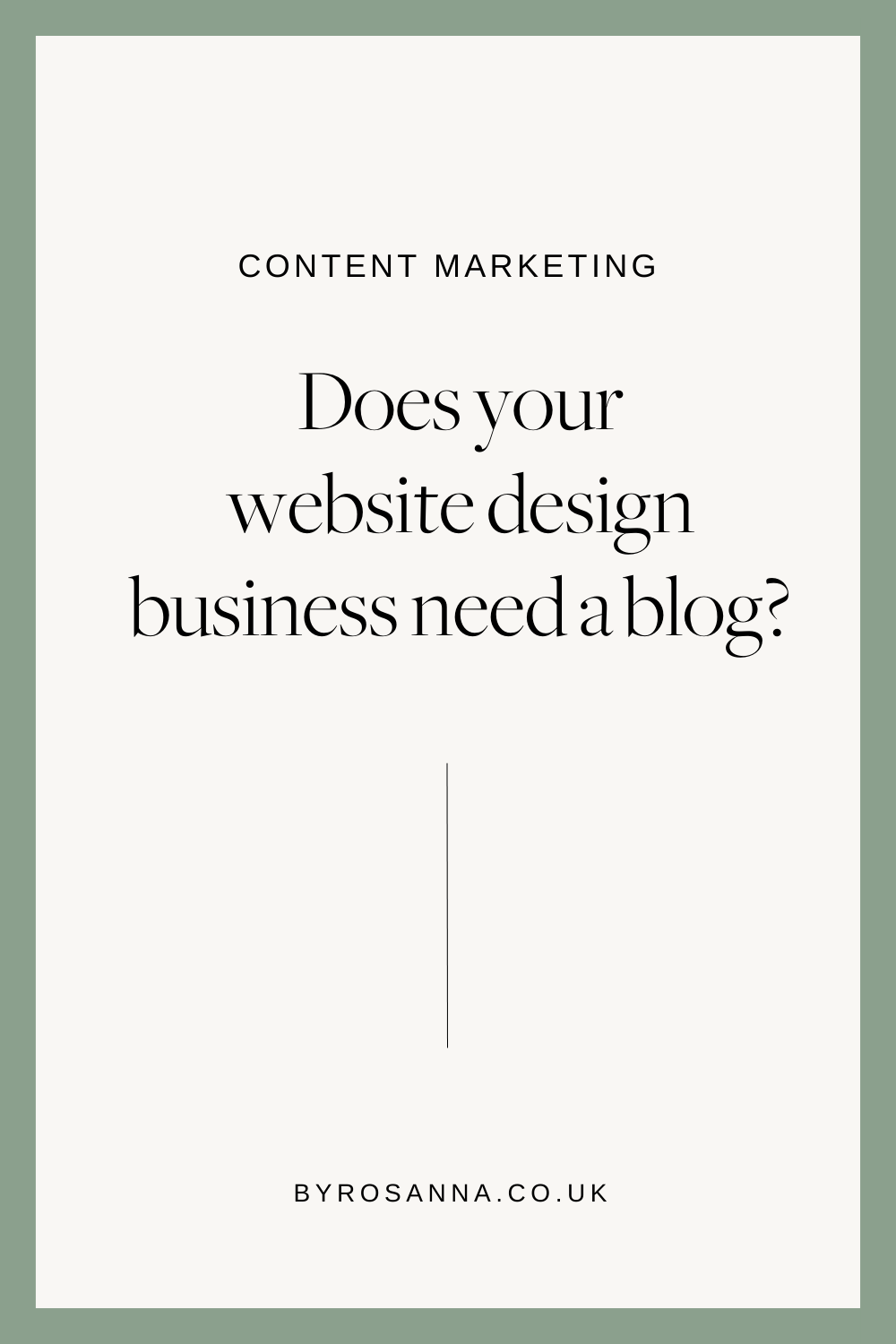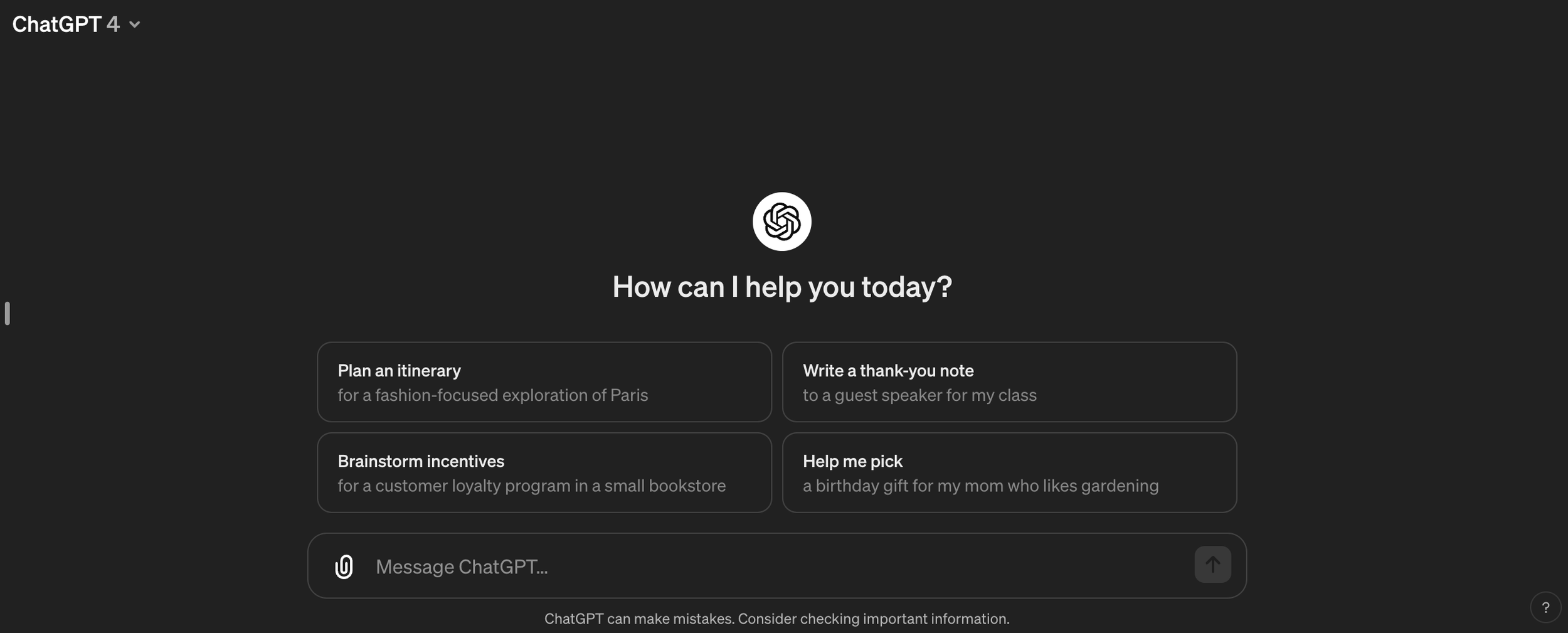Does my website design business need a blog in 2025?
Blogging for website designers: is this still a good strategy for marketing your web design business?
If you’re a website designer or creative business owner, you might have heard mixed things about blogging.
I feel like there has been more ‘chatter’ about blogging in general over the past few years, as people have been looking at other ways to market their business that might not involve using Instagram (thanks to ever-declining reach and engagement on the platform!).
So I want to dive deeper into whether this type of content is still useful for our web design businesses!
Table of Contents
Watch this as a video below or keep scrolling to read:
*Disclaimer: This post contains affiliate links where I get a small commission if you make a purchase, so thank you in advance for your support! Please know I would never recommend anything that I don’t personally LOVE myself.
Why have a blog for your web design business?
Having blog posts on your website can be useful assets to your business because blog post readers = traffic on your website!
When your blog readers are the same people as your ideal clients, this is golden, because those people are now on your website, and will hopefully stay there and have a look around at your services and other offerings.
More traffic on your website also generally helps to indicate to Google and other search engines that your website is ‘popular’, which helps your overall SEO (search engine optimisation) because search engines sometimes take a website’s popularity and authority into account when deciding where to ‘rank’ it.
We’ll talk more about the pros and cons of blogging in a moment…
How has blogging changed and how is it different for 2025?
The early 2010s blogging era
I’ve been blogging for over 10 years - both here and on my travel & lifestyle blog - and I definitely witnessed the shift that happened around 2016, where people stopped reading blogs in the same way as they did before.
Before the rise of Instagram, people consumed blog posts in the same way you might scroll through Instagram posts or follow specific peoples’ accounts. You followed a specific person or business’ blog to keep up with what THEY were sharing - no matter the topic (expert/skill topics, inspiration, or journal/diary entry style posts, for example!).
In the early 2010s, it was common to go directly to a specific website’s blog just to ‘see what they had posted about that week’.
2016 - 2024
Social media and Instagram in particular kind of replaced that way of consuming blog content, because you could just go on an app to follow your favourite bloggers, websites or experts and keep up with their recent content.
But blogging still had a purpose thanks to its ability to go a lot deeper into a topic and share a lot of information in one place (eg. like this post you’re reading now!), which social media can’t really do.
People might have stopped searching for bloggers or blogs to follow, but they didn’t stop searching for the very specific topics they wanted to get more in-depth information about.
If someone searches a question or wants more information about a topic on Google, a large % of the results that come up are blog posts! And that’s how most people come across blog posts nowadays.
eg. This very blog post!
We’ve still been reading blog content, but usually through finding it via a search platform like Google or Pinterest (OR through a business sharing that content on their social media or to an email list… but we’ll talk about that later).
Naturally, this meant that blog posts that weren’t being searched for on Google, or that weren’t being ranked by Google, ended up getting a LOT less readers than they used to, and traffic to those websites decreased.
This led to business owners and bloggers focusing more on creating blog content that would be searched for and get ranked on Google, and creating blog content for SEO (ie. search engine optimisation) has now become a whole industry in itself, because this is the main way that people have been finding and reading blog content.
It takes much longer to write the highly in-depth and well-researched articles that Google ranks at the top, but can be an amazing way to bring in new traffic to your website from people searching for specific things.
2025 - ?
Thoroughly researched, good quality articles that are written with SEO in mind and answering someone’s questions or searches are GREAT, but they are usually pretty informational.
And with the boom of ChatGPT and AI generated content in 2023, information has now become a commodity.
Anyone (or any AI tool!) can very quickly and easily create SEO focused blog content with lots of information, so it has become much less valuable, and search engines have been flooded with it.
There are two problems that we’re now seeing with this kind of content:
Overwhelm: People searching on Google are being met with millions of websites and blog posts that all sound the same.
Lack of trust: Unfortunately a lot of AI generated content can be factually incorrect! And (right now) there are lots of issues with websites publishing blog content that hasn’t been fact checked, so it’s difficult to know which listings on Google we can trust.
Therefore readers are starting to specifically look for websites/blogs/sources that they TRUST in order to find the information they need (similar to how they would back in the early 2010s!).
It’s extremely important for us as business owners to recognise this shift. We need to not only be sharing quality, researched content that helps our SEO, but also build a reputation as a content source that people can trust (and actually enjoy reading!).
How does AI search impact blog post SEO?
As of 2024 we now also have search engines using AI generated results and answers, so there has been a lot of conversation around how that will impact peoples’ SEO and blog posts.
As you’ll see, the AI gives a very general overview of a topic and on the right-hand side, references top articles it has sourced from. This just means we need to position our websites and blog posts to appear here as a referenced article, similarly to how we already optimise our posts to appear on the first page of Google. It definitely doesn’t mean that blogging is dead!
It’s also another reason why it’s so important to build your trustworthy brand as I mentioned above, so that your audience chooses to learn from you rather than rely on AI generated results.
Want to learn how to create SEO focused blog content to attract more clients to your web design business? This is exactly what I teach inside my In Demand Designer® program!
Common misconceptions of blogging
“The only reason to have a blog is for SEO purposes.”
Yes, SEO is a big factor in many peoples’ decisions to add a blog to their website, but it’s not the only purpose of a blog. It can also be used to provide a useful hub of information for frequently asked questions you get from clients, or as a way to share case studies and portfolio work.
A lot of people find writing very therapeutic, and find it a helpful creative outlet for their thoughts, opinions and insights. Depending on how you structure you’re writing and the audience you already have for your brand, this type of blog can still get a lot of readership.
“No one reads blogs anymore.”
As mentioned above, the way that people find blog posts and read them has changed over the years, but they are definitely still reading them! Whether it’s a recipe blog post for your next dinner party, a ‘how-to guide’ on how to fix something on your phone, or an interesting breakdown / ‘opinion piece’ on the latest news in your industry.
“If I have a blog, this will automatically make my SEO better.”
Just setting up a blog on your website and sporadically sharing the occasional post without any strategy will not do anything for your website’s SEO.
You need to have a strategic content plan that helps you to achieve your business goals, and write your content in a specific way to optimise for search engines (if you want to learn how, I teach this inside In Demand Designer®).
“You have to be good at writing to blog.”
If you detest writing, or you find it really difficult or struggle with dyslexia, for example, then don’t worry - you can still utilise the advantages of blogging! Inside In Demand Designer® I show you how to follow easy blog templates & formulas, plus use AI tools as sidekicks, to help you through the writing process (or even turn audio/podcasts/videos into blog content automatically!).
The pros of blogging
Show your expertise
Having a blog allows you to show off your knowledge by writing about your industry, and position yourself as an authority about a certain topic.
Add personality
Have your clients get to know you a little better by injecting your brand voice and personal elements such as a look behind the scenes or information about you as a person (this is what people are really craving more of in a world of so much AI generated content!)
Increase website traffic
Businesses with blogs receive 55% more traffic than without! It’s a great way to bring more visitors to your website, because you can share this content on other platforms (and hopefully get ranked on Google if you’re writing strategically). As long as you’re creating the right TYPE of content for your ideal clients, this can lead to more enquiries/sales.
Benefit SEO
As I’ve mentioned above, when you blog with a strategy in place and structure your posts in the right way, this can have a really positive impact on your overall website’s SEO.
Gives a starting point for more content
You can use your blog posts as a starting point for creating other content, such as social media posts, more quickly and easily.
The cons of blogging
It takes time to write
Blogging does take time and effort, from the planning and research stage, to outlining, writing, and optimising. You just need to be prepared for this! I share strategies for streamlining this process and making it feel fun & easy inside my program, In Demand Designer® .
It takes time to promote
Lots of people forget about this stage of the blogging process. You don’t just hit publish and forget about it! You have to promote it so that people read it, which means social media scheduling, sending it to your email list and more.
without a strategy, it can be a waste of time
If you’re not doing the right research and formatting your blog posts in the right way, it’s easy to find yourself spending a lot of time writing posts that actually aren’t benefitting your business.
How does blogging fit in your content marketing strategy for your website design business?
When starting a new content marketing platform, it’s always important to understand its purpose and where it fits within your overall marketing strategy.
What do you actually want your blog posts to achieve? How does it link with the other content you create - for example - on Instagram?
I explain all about creating a content funnel and why it’s important for the success of your website design business, inside In Demand Designer®.
As a website designer, what should I blog about?
To give you an idea, I’ve been blogging since 2015 (between 1 - 4 times a month) and I’ve not run out of post ideas yet!! Below are some simple ideas, but I share how to generate infinite content ideas in my In Demand Designer® program.
Thought pieces on industry news/trends
A 'why you need [INSERT YOUR PRODUCT/SERVICE HERE]' post
Local event, or exhibition, attendance heads up + round up
An 'experience' blog post ('what we learned from...')
How to guides and tutorials
How often should I blog?
Obviously how many blog posts you can create will depend on the purpose of each post. Typically SEO-focused content needs to be longer, more in-depth, and takes a longer time to research and write, while other types of content you’re creating for clients or for inspiration/entertainment may not take you as long.
So it will really depend on this and your own time constraints too!
I’d recommend aiming for a minimum of 1-2 per month, and more often if you’re able to time-wise. The more blog posts you create, the more content it gives you to share on your other marketing platforms too which can be really useful!
Ready to add a blog to your website?
Join the program for website designers to build an audience online and convert more dream clients!
Inside In Demand Designer® we create your Personal Brand Blueprint and ‘Backstage’ & ‘Frontstage’ content funnels to help you attract, nurture and convert more of your dream clients.







